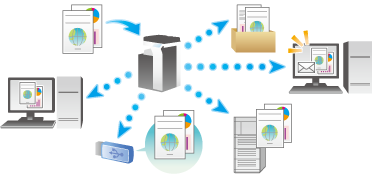
Operations Available with Scan-to-Send Function
The scanned original data can be sent to a computer or server, and saved on the hard disk (User Box) of this machine.
It may be necessary to make the following settings prior to using the Scan-to-Send Function. For details, refer to the explanations of each function.

The Scan-to-Send Function provides the following sub-functions.
Function | Description |
|---|---|
Scan to E-mail | Sends a converted file to any E-mail address as an E-mail attachment. |
SMB Send | Sends a converted file to a shared folder of a computer. To use this function, specify your computer or file server as a destination. |
FTP Send | Sends a converted file to the FTP server. This function is useful when transferring a file through the FTP server. |
WebDAV Send | Sends a converted file to the WebDAV server. This function is useful when transferring a file through the WebDAV server. |
Save in User Box | Saves the original data scanned by this machine in a User Box of this machine. The original data saved in a User Box can be sent to a shared folder or sent as an E-mail attachment. |
WS scan | Imports original data by issuing a scan instruction from a computer without configuring complicated system settings, or sends original data scanned by this machine to a computer. This function is supported by Windows Vista or later. |
TWAIN scan | Converts original data scanned by this machine into a file, and imports it from a computer on the network using applications compatible with a TWAIN device. |
Scan server sending | Sends a converted file to a scan server. When receiving a file, a scan server sends it as an E-mail attachment based on a workflow, or saves it in a shared folder of a computer. |
Panel Link Scan | Sends the original data scanned on this machine to the storage of the terminal or the Google Drive. This function, which is the Panel Link function of Remote Access, is available when this machine is remotely operated from an Android/iOS terminal. |
Original data scanned by this machine can be saved in the USB memory connected to this machine. For details, refer to Here.
